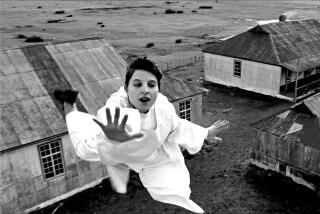Vicente Leñero dies at 81; writer stirred controversy in Mexico
- Share via
Mexican novelist, playwright and screenwriter Vicente Leñero, whose popular works stirred up controversy in government and religious circles, died Wednesday at his home in Mexico City. He was 81.
His death was announced by the National Council for Culture and the Arts. Leñero had been suffering from lung cancer, according to Mexican media reports.
Among his best known, and most controversial, works is the screenplay for the 2002 film “El Crimen del Padre Amaro” (“The Crime of Father Amaro”), the highest-grossing domestic film in Mexico. The tale of corruption and sex in a small town so angered Catholic church leaders that lead actor Gael Garcia Bernal was threatened with excommunication.
Protests by conservative Catholic groups followed the film to Los Angeles, where it had a limited release in late 2002. Los Angeles Times reviewer Kenneth Turan said that although the film was an “unapologetic anticlerical melodrama,” it was “determined to treat its characters, weak and strong, as fallible human beings, not caricatures.”
Upon hearing of Leñero’s death, Bernal tweeted, “How sad. Goodbye dear Vicente Leñero.”
Leñero was an old hand at stirring up established forces. A 1983 production of his play, “Martirio de Morelos” (“The Martyrdom of Morelos”) was called “the season’s most controversial show, in fact something of a scandal,” by Times theater reviewer Dan Sullivan on a visit to Mexico City. The play about Jose Morelos, a hero of the 19th century Mexican War of Independence against Spain, dared suggest that as a result of being tortured, he betrayed independence forces by giving away battle secrets and names.
Though Leñero said that the story was based in historic fact and showed Morelos to be human, the production was threatened with closure even before its debut. But it went on, and Sullivan called it “stunning.”
Authorities did manage to close, temporarily, Leñero’s 1988 play “Nadie Sabe Nada” (“Nobody Knows Anything”) about collusion between journalists and officials. The government Institute of Fine Arts, which underwrote the first production, shut it down during previews. But Leñero, who also worked as a journalist for several publications, stood by his work.
He told the New York Times. “The subject has a certain immediacy to anyone who lives and works in the journalistic medium, and you have a choice of treating it as drama, tragedy or farce.”
After a few small changes were made, the show — which had become a cause celebre — drew long lines when it finally opened.
Leñero was born June 9, 1933, in Guadalajara, Jalisco. Writing was not his first choice as a profession — he studied engineering at the Universidad Nacional Autonoma de Mexico in Mexico City.
But he enrolled in a journalism school “because I thought that’s where I would learn to write,” he said in an interview with Christopher Dominguez Michael. “Writing has always been difficult.”
Despite the fuss he stirred up with several of his works, Leñero was described as “modest, unassuming and deeply religious” by essayist George R. McMurray, who profiled him for the “Encyclopedia of World Literature.”
Leñero won numerous literary prizes in Mexico, including one from the fine arts institute that closed down “Nadie Sabe Nada.”
When he died, the institute sent a tweet, calling him “a key figure in Mexican drama of the 20th century.”
Among his survivors is his wife, Estela Franco.
Twitter @davidcolker
Times staff writer Tracy Wilkinson in Mexico City contributed to this report.
More to Read
Start your day right
Sign up for Essential California for the L.A. Times biggest news, features and recommendations in your inbox six days a week.
You may occasionally receive promotional content from the Los Angeles Times.







